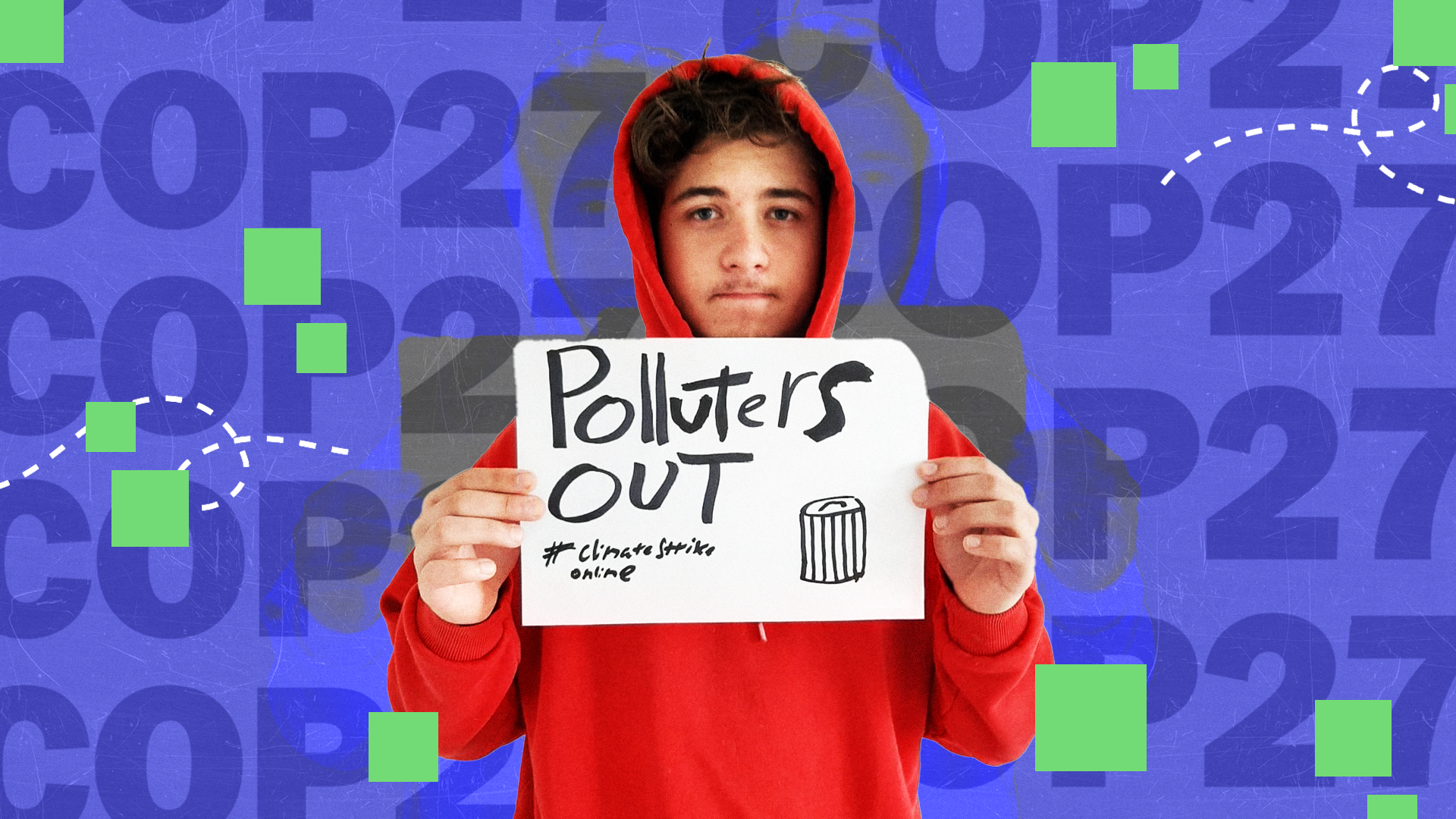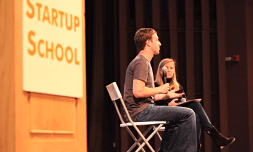Thred: How long have you been at COP27 this week?
Michael: I turned up a week before COP. It’s been very busy. I’ve been attending as many events inside the Blue Zone as outside. It’s a little bit too much to comprehend, but hopefully I’ll be able to shine and shed a light a little bit here.
Thred: Absolutely. And have you been to any particularly good talks? Is there anything that’s caught your attention so far?
Michael: I think there’s a lot of interesting conversations on the private sectors, specifically on blended finance. I’ve been a little bit here and there, but not too much, um, as observers are not very much allowed into negotiation spaces. Loss and damage is big on the agenda this year, which it has really never been. I think that’s something that has impressed me a little bit.
Thred: I’d be really interested to know your thoughts about the Children and Youth Pavilion. It’s providing young people with a dedicated platform to hold discussions and policy briefings, but in my opinion, as exciting as this is, it still isolates young people and it excludes them from the real decision-making spaces. Do you have any thoughts on this from what you’ve witnessed so far?
Michael: I might disagree with that actually. This is my second one physically, but this is the first time that there’s ever been a Children and Youth Pavilion. And the pavilion is very, very large. It’s the middle of the entire facility, everyone sees it all the time.
Negotiators have to walk beside it in order to pass to conference rooms and it’s actually had a really big impact here. I think it’s been extremely big. I think it’s put youth and youth movements really visibly here on the agenda, which it has never been before.
Every pavilion here is using a lot of money and wasting a lot of it. Most of the pavilions cost upwards of half a million dollars and, previously, no one used them. I think it’s quite impactful to have one that has people thinking about youth inclusion, seeing that young people are here.
There’s nothing concrete that happens in pavilion, and everyone here knows that everything happens in negotiation spaces. But having that kind of platform visibility for young people that everyone has to see and has to look at every day, I think it’s a fantastic step.
Thred: That’s a really thorough insight. I have to kind of agree with you there. I think it is a bit of a double-edged sword. It’s definitely a really important thing to have a space specifically for young people to connect, but there is more work to be done.
I wanted to ask how the climate crisis has affected your work and professional life? Do you feel that it has become your main focus?
Michael: Definitely, it has become my main focus and passion in life.
In my youth – which wasn’t too far ago – when I was 14, I was struggling with some mental health challenges like many people do today. A lot of it was because I didn’t feel like I had purpose in my life. I saw how important it is to solve climate change, and it allowed me to affirm that my life matters. I’m doing something that’s important.
In terms of climate anxiety, I think everyone faces that. There’s a lot of fantastic climate mental health movements that are really important, and one of the things that helped me get out of that anxious headspace was climate education.
Climate Science provides one million people in 190 countries with accessible climate education, and that can help people focus their lives on more positive action.
Thred: Mental health is a recurring theme we’ve come across during this week. I think, as you say, it’s really amazing that there are so many people out there striving to put that at the front of the conversation and ensure young people do have protections around their mental health.
Are there any specific topics that you’d like to be discussed today? What are you hoping to see from today’s conversations around decarbonizing?
Michael: I think it will be interesting to hear Biden’s address soon. I know many young people are waiting for it. It’s going to be interesting to see how Article Six is going to be expanded.
I always look at everything from the education sense, right? I think almost in everything, everywhere, all the time, education is under prioritized and that is very dangerous. Education is the ability to make better decisions, and if we don’t have that implemented into our decision making, nine times out of ten, we’re going to make the bad choice.
How do we know what tools are available to lower our carbon footprint, and how can we choose the best ones? How can the individual person feel that their credits and their money is going to a place that actually helps them?
I think that’s the big elephant in the room. Everyone here talks about how wonderful it will be when society is able to offset everything reliably, they only focus on the validation part. I think there’s a lot of false hope in expecting people to use these tools.
Thred: How do you think Gen Z will view this year’s COP27? And how will they approach decarbonisation in the future, do you think? Will there be differences compared to older leaders?
Michael: I think there’s going to be a lot more ambition. Every year we run a competition around creating solutions to climate change and we had 55,000 participants last time. In fact, just yesterday, Gen Zers from that competition managed to present their solutions to real government negotiators.
The takeaway from that is that anyone can solve climate change if you actually look at the things that make sense. A lot of times governments in these spaces put themselves in these kind of mental prisons, these restrictions. These things that put you in a box of how things should be done.
The unique thing that young people bring to the table, whether it’s decarbonisation, loss and damage, or adaptation, is the ability to think outside of the box, because they never were inside it in the first place.
That’s what we find at COP, in my opinion. That’s what we find in young people.
Thred: Countries that produce emissions, should they be paying offset to those that they affect?
Michael: Yes. I think in fact that’s something that has been talked about at several panels.
There was a pretty clear message that the days where private sectors work in the Global South, sourcing their resources in the Global South, and profiting somewhere else, are gone. I think there is an increased standard, or at least it seems that way.
Corporate responsibility has been mentioned a lot. If you’re not a responsible corporation, you will face consequences. If you are not mindful of your business communities, and if you don’t think in a global way and focus only on profits, you are not invited to these conversations. You’re going to be side-lined and you’re going to fail.
I’m interested to see what’s going to happen and if these things are going to be implemented. These ideas are interesting and cool, but I don’t want to give too much credit that hasn’t been earned yet.
Thred: What kind of advice would you give to Gen Zers looking to get involved and how can COP be more inclusive of young people?
Michael: Having more young people at the table, that’s the obvious answer. Having more COP training for young people. Giving more ownership to young people and letting them cover their agenda points and lead them, not just be a part of them. Gen Z should be allowed partnerships that encourage innovation.
We need to be doing a lot more to include young people in the building process before these things happen. COP28 is already organised. COP29 is probably going to start being planned not too long from now. The decisions and the things that happen here get decided way beforehand. That’s where we need young people.
For advice, I’d say figure something out that you are passionate about. Figure out the interconnection between that and things you’re good at.
Older people may say you don’t know enough, you don’t have enough experience. Prove them wrong. Do your research. Figure out the thing that you are very good at and become an expert at it.
People are so diverse with ranging skillsets. COP is not the only negotiation room, it’s also all about the side events that are happening here. It’s pushing people from the private sector, from the inside, to do better and to funnel more funding into dynamic projects
You don’t have to fit a certain shoe, right? Whatever you have, whatever you’re good at, bring it. It’s needed.
Thred: That’s really sage advice. Thank you so much. On a final note, what do you hope that the future of climate activism and tech innovation looks like? What do you hope will be seen as a focus or big change as we get deeper into this century?
Michael: I love this question because this is what climate science is about. I want to see a world where climate activism doesn’t only mean being a politician or an activist. I love my fellow activist, but not everyone’s going to be like us.
I want to see a world where when we say ‘climate activism’, people would think about engineering. People would think about solutions, climate communicators, which the fossil fuel lobby has a lot more of than what we have. People would think about start-ups, people would think about re-imagining our economic systems.
So I think that’s something I’m looking forward to eagerly. I think that’s something that education has a massive role to play in.
Thred: Thank you so much for speaking with us today. It’s been really, really amazing. Just to round up, is there any way that people can get involved with your work?
Michael: We have a Climate Duolingo that’s on the App Store, available online and in thirteen different languages.
There are videos, kids’ books, beach resources, there’s everything for you. We’re always welcoming more feedback if you’re interested in helping to create a world that’s actually prepared to fight climate change.
If you’re interested in that, you’re welcome to get in touch. We have a contact page, we have everything. You can find us on LinkedIn, on all social media platforms. Visit the Climate Science website here.




















